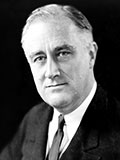

- Korematsu v. United States full program
- Fred Korematsu receives Presidential Medal of Freedom
- U.S. Office of War Information film: "Japanese Relocation"
- Justice Breyer on Korematsu v. United States
- Supreme Court Mistakes: Korematsu
- Norman Mineta Oral History
- Hirabayashi v. United States
- Due Process and Internment Camps
- Topaz Artifacts
- Internment and the Roosevelt Administration
- Justice Black's Library
- Life at Topaz Internment Camp
In Korematsu v. United States (1944), the Supreme Court, in a 6-3 vote, upheld the government’s forceful removal of 120,000 people of Japanese descent, 70,000 of them U.S. citizens, from their homes on the West Coast to internment camps in remote areas of western and midwestern states during World War II.
Japan’s attack on Pearl Harbor, Hawaii in December 1941 prompted anti-Japanese sentiment across the country and fears that Japanese Americans on the West Coast were still loyal to Japan. In response to these fears, President Franklin Roosevelt authorized the War Department to remove persons of Japanese ancestry from their homes and confine them to internment camps. American-born Fred Korematsu refused to leave his home in California. He tried to avoid capture and relocation, but when he was eventually caught, he challenged his conviction, arguing that internment was a violation of his constitutional rights. In the Court’s 6-3 decision, Justice Hugo Black acknowledged that racial discrimination is “immediately suspect” but said that interning Japanese Americans was within the war powers of Congress and the president. Fred Korematsu’s conviction was eventually overturned in 1983, and in 1998, he received the Presidential Medal of Freedom from President Bill Clinton.

Fred Korematsu was an American-born son of Japanese immigrants. After losing his case against internment, he was sent to a camp in Topaz, Utah for the remainder of the war. Years later, the federal government apologized for internment, and a California judge finally overturned Korematsu’s conviction. In 1998, he received the Presidential Medal of Freedom.

Franklin Roosevelt (January 30, 1882 – April 12, 1945) was president of the United States (1933 – 1945) during the majority of World War II. In response to civilian panic and urging from some of his advisors, Roosevelt signed Executive Order 9066, authorizing the removal of over 120,000 Japanese Americans from their homes on the West Coast.

Hugo Black (February 27, 1886 – September 25, 1971) was the Supreme Court justice (1937 – 1971) who wrote the majority opinion in Korematsu. Black was President Franklin Roosevelt’s first appointment to the Court and strongly supported his policies. In his opinion for the Court, Black urged deference to the President, Congress, and the military during wartime.

Charles Fahy was the solicitor general of the United States during World War II. During Korematsu’s trial, Fahy kept from the Court a naval intelligence report vouching for the loyalty of Japanese Americans and arguing against internment. Fahy argued instead that Japanese Americans were motivated by “racial solidarity” and should stay in internment camps.


